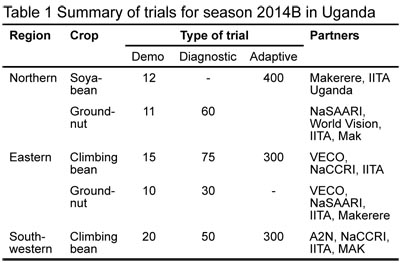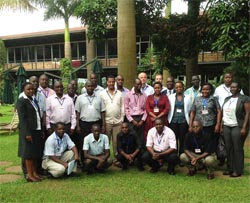Progress has been made in implementing the N2Africa project since its launch early this year and I am hereby pleased to briefly share the progress per objective:
Objective 1. M&E and capacity building
Recruitment of the staff is complete. We have a Business Development officer, a Data Analyst, two liaison Officers (for both Northern and Eastern regions), a Finance and Admin assistant and a driver. You can view their profiles on www.N2Africa.org. For capacity building and addressing important research questions, we also recruited a PhD candidate, Mr. Allan Ochieng. He will work on bio-prospecting of effective native rhizobium strains for bean inoculation.
To improve the infrastructure for production of quality inoculants, IITA procured laboratory equipment for the Makerere Microbiology laboratory to complement the other efforts by the COMPROII project. The N2Africa project also procured a greenhouse under this arrangement. In terms of M&E, we conducted a Baseline survey among 400 households. Data processing is underway.
Objective 2. Dissemination, delivery, input and output market
In the last season 2014a, seven demonstrations of N2Africa technologies were conducted. The demonstrations included climbing beans’ response to nutrient inputs and staking methods in Kapchorowa district (Mt Elgon highlands) and soyabean responses to fertilizer and inoculation and groundnut response to P fertilizer in Eastern and Northern Uganda by World Vision Uganda.
|
For the season 2014b, we have a much larger number of trials (see Table 1). For climbing bean, the large farmer cooperative working with VECO has set up 15 parish level demonstrations, 75 diagnostic trials and 300 adaptive trials in Kapchorwa. The demonstrations evaluate the effect of P-fertilizer for NABE12C. For soyabean, 12 demonstration and 400 adaptation trials have been set up in northern Uganda to test the response to inoculation and P-fertilizer. The rotational effects of soyabean will be evaluated with sorghum in the subsequent season. In addition, 11 demonstrations and 60 diagnostic trials have been established for groundnut. |
 |
From the 2014a season, we have seen that the farming communities are interested in the dissemination efforts. They are keen to improve productivity of their crops using the technical knowledge they have received so far. You can read an example of groundnut dissemination later in this podcaster.
Partnerships to support dissemination, input and output markets access
|
Participants at the National partners meeting held at Kabira country club, 19-20th June 2014 |
A national stakeholders meeting was held in June 2014. Beside the lead dissemination partners (World Vision Uganda, VECO Uganda and Africa 2000Net work Uganda), ZOA is interested in disseminating N2Africa technologies to farmer associations they work with in parts of Northern Uganda and West Nile. In addition, Integrated Sector Support programme (ISSD) is keen to collaborate with World Vision and VECO to support capacity building in local seed business development. The National Soyabean Network likes to support brokerage in marketing of soyabean and provision of technical information. Finally, Farm Radio International is keen to support technology dissemination by developing and implementing the Farm radio programmes.
|
Multi-stakeholder platforms
Some important platforms through which N2Africa can engage various stakeholders have been identified. These platforms include 1) the SNV supported Oil Seed Support Platform (OSSUP) in northern Uganda for soyabean, 2) a groundnut platform initiated by VECO in eastern Uganda, and 3) National Maize and beans platform hosted by the Ministry of Agriculture Animal Industry and Fisheries. The Business Development Officer is already engaged in the platform meetings to create awareness about the N2Africa project.
Via the OSSUP platform, Nile Agro is interested to enter a private public partnership for soyabean. NASECO, a soyabean seed producer, is keen to disseminate the N2Africa technologies and to develop and strengthen a pipeline for the delivery of packages to smallholder farmers. These packages can include affordable seed, rhizobium inoculants from Makerere University and P-fertiliser. NASECO is also keen to work with World Vision in the promotion of soyabean and a PPP arrangement is being developed for this purpose. The Export Trading Group (ETG) is potential trader in buying bean and soyabean grain and could be included in PPP agreements. Another prospective partner is Harvest Plus to link with dissemination partners to scale out iron enriched beans (bush and climbing beans).
Alongside the involvement of new partners, Makerere University and NARO are still the main research partners to support the agronomic and capacity building efforts. We also reaching out to include CIAT Uganda.
By Peter Ebanyat, Country Coordinator


